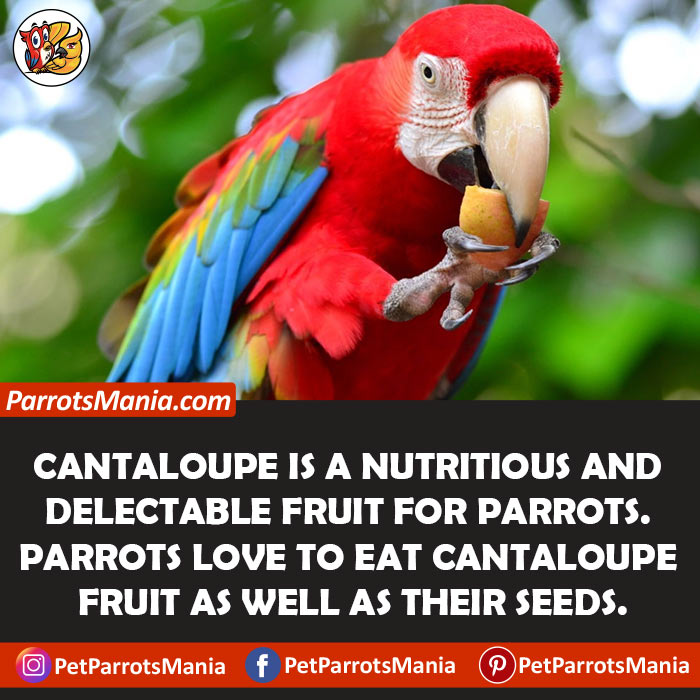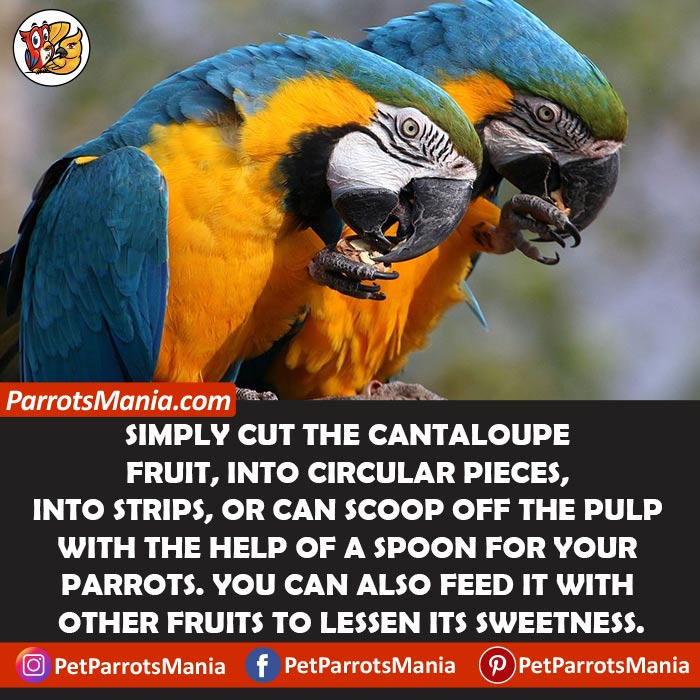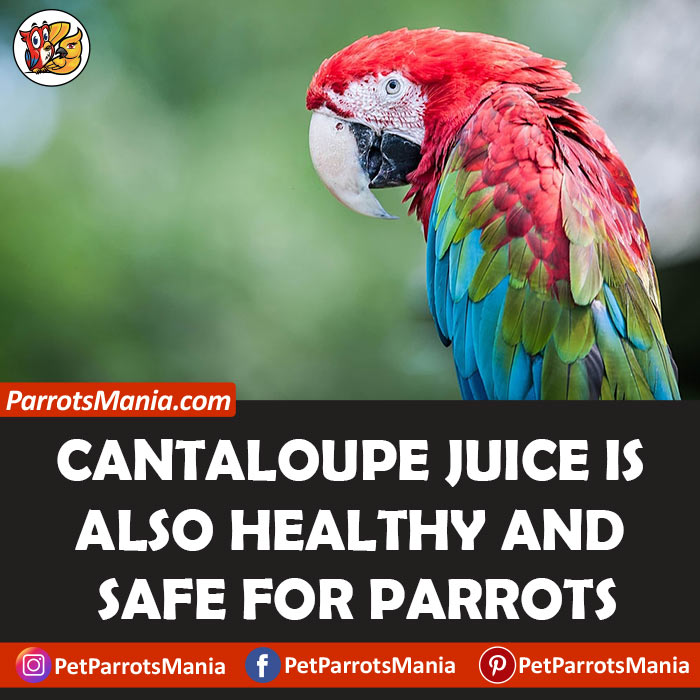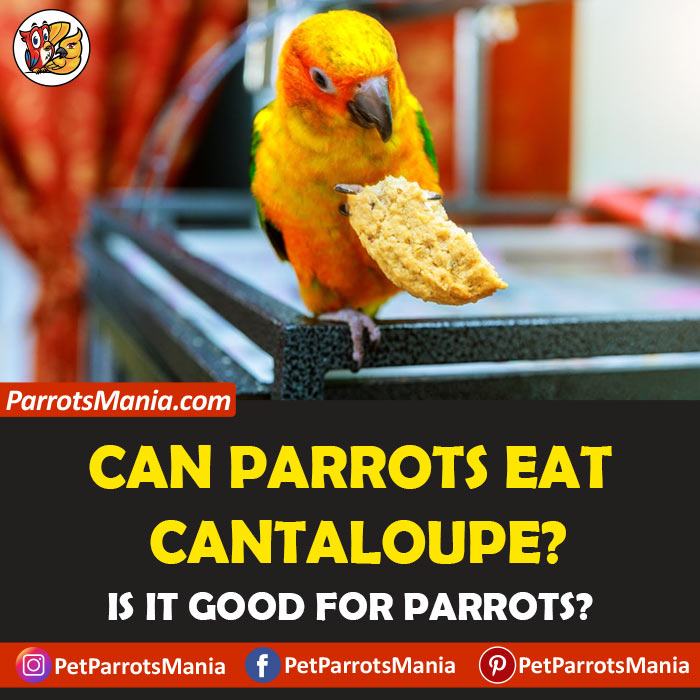Last Updated on April 1, 2022
Parrots love to eat various foods, keeping them healthy and happy. Most pet owners always search for new food for their parrots. So in this article, I will discuss Can Parrots Eat Cantaloupe? Are they healthy? And other basic things about cantaloupe for parrots.
Cantaloupe is a nutritious and delectable fruit for parrots. Your parrots may love to eat cantaloupe fruit as well as seeds. But as you know, a high amount of nutrients can disturb a parrot’s health, so you should always serve cantaloupe in small food portions so that your parrots only enjoy the positive effects of cantaloupe.
Now, I am sure there are different questions in your mind related to cantaloupe for parrots, so here I will cover almost all relevant questions of cantaloupe. So that you can have a complete detailed guide about cantaloupe for parrots, let’s start with the topic.
Cantaloupe For Parrots:
Cantaloupe fruit is healthy, safe, enriched with numerous nutrients, and most importantly, the flesh of the cantaloupe is super delicious. So parrots mostly love eating cantaloupe.
Cantaloupe is a melon-type fruit that tastes the same as watermelon and melon. And it is considered a super melon not only for humans but also for parrots. This fruit also fulfills the parrot’s craving for sweetness because fruit contains natural sugar content.
Thus you need to serve in moderation, and it is entirely in your hand because your parrots don’t know if it can harm them or not as parrots will always enjoy the unlimited portion of cantaloupe in their diet.
Other than sugar, cantaloupe has different other nutrients, so that’s why you should serve in limited food portions.
Here I will discuss other important things to clear your mind related to cantaloupe for parrots.
How Much Can Cantaloupe Parrots Eat?
Cantaloupe is an amazing fruit, and most parrots like eating cantaloupe, but it doesn’t mean you can feed them a daily food diet. You can’t ignore the fact that cantaloupe is high in sugar content, so it can disturb the parrot’s health and cause diabetes and other issues. So, while keeping these things noted, you can feed cantaloupe as a fruit treat once a week in a limited food portion. Or, if you have big parrots, you can also serve two times a week, depending on the parrot’s health.

How To Feed Cantaloupe For Parrots?
Cantaloupe is super delectable for parrots, so you should definitely try to feed it if you haven’t tried it yet. While serving the first time, you can serve a teaspoon of cantaloupe flesh to your parrots, just to ensure their response; if they like to eat it, then you can feed cantaloupe to parrots.
You can simply cut the cantaloupe fruit, into circular pieces, into strips, or can scoop off the pulp with the help of a spoon for your parrots. You can also feed it with other fruits to lessen its sweetness.

Here I will let you know different parts of cantaloupe so that you should know before serving whether it’s safe for your parrots or not.
Cantaloupe Skin:
Cantaloupe rind/skin or you can say peel is not edible for parrots. Cantaloupe skin is hard and contains different chemicals such as Salmonella and Listeria Bacteria harmful to parrots. Besides this, cantaloupe skin also has traces of pesticides and other dirt substances, which can be problematic for parrots. Also, while serving cantaloupe to parrots, always remove the skin appropriately and rinse cantaloupe under cold water to remove bacteria or dirt, and then cut it for parrots.
Cantaloupe Seeds:
Cantaloupe seeds are edible for parrots and are healthy and safe for parrots. You can serve them to your parrots, both raw or roasted. But raw ones are always nutritious, and roasts are tasty so that you can serve roasted seeds as a treat. Also, cantaloupe seeds contain multiple nutrients, so feeding cantaloupe seeds as a snack or with other seeds and grains will provide various health benefits to your parrots. But make sure to feed natural cantaloupe seeds and avoid feeding market-purchased packed seeds, as they contain extra components and preservatives that are unsuitable for parrots.
You can easily prepare cantaloupe seeds at home by removing seeds from cantaloupe fruits, washing them properly, and then leaving them for 2 to 3 days, and after they get dry properly, store them in a closed jar for your parrots.
Cantaloupe Juice:
Cantaloupe juice is also healthy and safe for parrots if you prepare it at home, without adding any other ingredients, and you also have to make diluted cantaloupe juice for parrots. It is tasty, refreshing, and cool for parrots and a good source of vitamin B6, A, C, folate, and niacin.

So the cantaloupe juice is loaded with nutrients that boost the immune system and have different antioxidants. You can serve a limited portion of diluted cantaloupe juice to your parrots once a week.
Cantaloupe Cake:
Cantaloupe homemade cake without extra ingredients is okay for parrots if you serve it as an occasional treat. You can provide a two to three teaspoon serving of cantaloupe cake to your parrots. While making the cantaloupe cake for parrots, you should use limited ingredients in small quantities to not affect parrots’ health.
Cantaloupe Desserts:
You may notice this is irrelevant, but this is important to notify because cantaloupe is a fruit you can use to prepare different desserts such as:
- Cantaloupe sorbet.
- Cantaloupe pie.
- Cantaloupe crunch.
- Cantaloupe granita.
- Cantaloupe and ice cream.
And many other cantaloupe desserts. So you may think that if cantaloupe cake or juice is edible for parrots, you can also serve any other cantaloupe desserts to your parrots, but let me correct you, all these desserts contain a lot of ingredients that are unhealthy for parrots, or they can risk parrots health. So you should never serve these desserts to your parrots.
Health Benefits Of Cantaloupe To Parrots:
Cantaloupe is jam-packed with multi nutrients, so serving cantaloupe to your parrots provides them different health benefits, such as:
- Beneficial for strengthening the immune system of parrots.
- Helpful for the development and functioning of the nervous system.
- Makes parrots energetic.
- Essential for the production of parrots.
- Maintains the functioning of the cardiovascular system.
- Aids parrots’ strong digestive system.
- Required for strong eyesight.
- Enriched with antioxidants.
These nutritional benefits depend on the appropriate serving of cantaloupe, so always serve in limited food portions.
Side Effects Of Cantaloupe To Parrots:
Cantaloupe is entirely safe, but excess consumption can disturb parrots health because the fruit is loaded with nutrients so that excess nutrients can cause adverse effects, such as:
Kidney diseases:
Cantaloupe contains potassium, so excess consumption of this nutrient can cause kidney diseases.
Diabetes:
Cantaloupe is high in sugar, so an excess serving of parrots can cause diabetic issues.
High risk of food poisoning:
Cantaloupe has Listeria bacteria that can cause a risk of food poisoning if you serve improperly, without safety precautions.
Conclusion:
Cantaloupe is a healthy, delicious, and safe fruit for parrots if you serve it appropriately. So always make sure to serve in a limited portion. I have entirely discussed all the relevant questions about cantaloupe for parrots to clear your thoughts so that you can easily serve cantaloupe to your parrots. If you have any related questions, you can ask in the comment section. I will love to answer all your queries.
Also Read About: Do Parrots Eat Chicken, Meat, And Fish?

